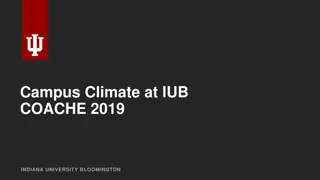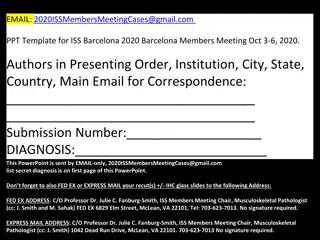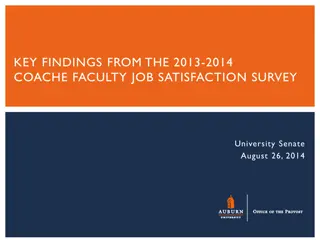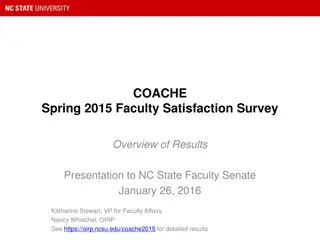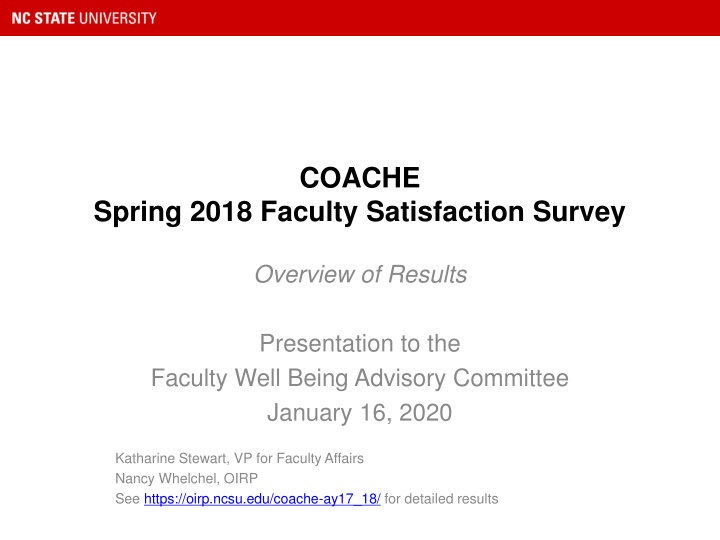
Overview of COACHE Spring 2018 Faculty Satisfaction Survey Results
Explore the detailed results and analysis of the COACHE Spring 2018 Faculty Satisfaction Survey presented to the Faculty Well-Being Advisory Committee. Topics covered include overall satisfaction, climate, leadership, department life, tenure, promotion, mentoring, facilities, personal policies, and more. Gain insights into what's going well and areas for improvement based on feedback from faculty members. Access reports, demographic comparisons, benchmark results, and peer comparisons to understand the findings better.
Download Presentation

Please find below an Image/Link to download the presentation.
The content on the website is provided AS IS for your information and personal use only. It may not be sold, licensed, or shared on other websites without obtaining consent from the author. If you encounter any issues during the download, it is possible that the publisher has removed the file from their server.
You are allowed to download the files provided on this website for personal or commercial use, subject to the condition that they are used lawfully. All files are the property of their respective owners.
The content on the website is provided AS IS for your information and personal use only. It may not be sold, licensed, or shared on other websites without obtaining consent from the author.
E N D
Presentation Transcript
COACHE Spring 2018 Faculty Satisfaction Survey Overview of Results Presentation to the Faculty Well Being Advisory Committee January 16, 2020 Katharine Stewart, VP for Faculty Affairs Nancy Whelchel, OIRP See https://oirp.ncsu.edu/coache-ay17_18/ for detailed results
Topics: Breadth & Depth Overall Satisfaction / Climate Leadership Department life Nature of work Tenure & promotion Interdisciplinary work & collaboration Mentoring Facilities & work resources / support Personal & family policies Health & retirement benefits Appreciation & recognition Governance
Population, Peers, & Response Rates Population FT Pre-tenured, tenured, Professional track (including librarians) Excludes: hired in current year in terminal year Senior administrators COACHE Peers Georgia Tech Iowa State University Purdue University UC-Davis Virginia Tech Response Rates NC State 50% Tenured / Tenure- track faculty (696 of 1,397) 46% Professional faculty (293 of 637) COACHE Peers 47% Tenured / Tenure- track faculty (3,501 of 7,442) 52% Professional faculty (704 of 1,344)
Reports on Results https://oirp.ncsu.edu/coache-ay17_18/ Narrative Reports Highlights Research methods & response rates Executive summary Demographic comparisons Benchmark results Data Tables Campus-specific questions Means & frequencies, overall & for subgroups Data Tables (cont.) Peer Comparisons Means, overall & for subgroups Frequencies All questions, overall & by tenure track status Means Subgroup comparisons Trends vs AY17-18 COACHE, overall & for subgroups
Whats Going Well & Opportunities for Improvement Most favorably rated Location / area Colleagues Academic freedom Quality of pre-tenured faculty Promotion to full (tenured faculty) Departmental leadership Library resources Tenure process (pre- tenured) Least favorably rated Governance Support for interdisciplinary work Divisional leadership Salary Health & retirement benefits Family/personal policies Clarity of promotion process (professional track) Mentoring
Benchmarks: Overall Average Ratings Governance: Adaptability 2.94 Interdisciplinary Work 2.94 Governance: Productivity 2.95 Governance: Understanding the Issue at Hand 2.95 Governance: Trust 3.06 Leadership: Faculty 3.09 Health and Retirement Benefits 3.10 Governance: Shared Sense of Purpose 3.12 Personal and Family Policies 3.13 Leadership: Divisional 3.18 Mentoring 3.29 Nature of Work: Research 3.32 Appreciation and Recognition 3.38 Leadership: Senior 3.42 Nature of Work: Service 3.43 Tenure Expectations: Clarity (pre-tenured fac only) 3.50 Departmental Engagement 3.59 Tenure Policies (pre-tenured fac only) 3.69 Facilities and Work Resources 3.72 Departmental Quality 3.74 Leadership: Departmental 3.77 Collaboration 3.82 Departmental Collegiality 3.84 Nature of Work: Teaching 3.84 Promotion to Full (tenured fac only) 3.88 0.00 0.50 1.00 1.50 2.00 2.50 3.00 3.50 4.00 4.50 5.00 Overall Average Rating
Trends Spring 2018 vs Spring 2015 Survey (Pre-tenure + Tenured Faculty) Overall ratings improved for College valued by Chancellor / Provost Department valued by Chancellor / Provost Chancellor and Provost stated priorities Faculty and admin define decision criteria together Faculty and admin follow rules of engagement Overall ratings declined for Stop-the-clock policies (Pre-tenured faculty only)
Trends Spring 2018 vs Spring 2015 Survey (Professional Faculty) Overall ratings improved for Mentoring of professional track faculty Faculty and admin have an open system of communication Provost cares about faculty of my rank Support for securing grad student assistance Support for faculty to be good mentors Effectiveness of mentoring outside the institution Overall ratings declined for Number of student advisees Health benefits for self
Sub-Group Comparisons Professional vs Tenure Track Faculty Professional track more positive than TT faculty @50 items Health and retirement benefits Governance Clerical/administrative support Personal and family policies Professional track less positive than TT faculty @10 items Interest in interdisciplinary work Discussions/interactions with (TT) colleagues Research (course release, influence over focus of) Collaboration outside institution
Sub-Group Comparisons Pre-tenured vs Tenured Pre-tenured more positive than tenured @50 items Governance Interdisciplinary work Mentoring Clerical/administrative support Support for research Salary Pre-tenured less positive than tenured 3 items Balance of professional/personal life Balance of teaching/research/service Quality of grad students to support research
Sub-Group Comparisons Associate vs Full Professors Associate more positive than full professors 0 items Associate less positive than full professors @25 items Promotion Mentoring Balance of teaching/research/service
Sub-Group Comparisons URM vs White faculty URM more positive than white faculty @45 items Department/college valued by Provost Governance Divisional leadership Recognition from Provost /Provost cares about faculty of my rank Head ensures faculty input Support for securing grad student assistance Interdisciplinary work is rewarded URM less positive than white faculty 6 items Clarity of promotion process Leadership/colleagues support for / commitment to diversity
Sub-Group Comparisons Asian vs White faculty Asian more positive than white faculty @75 items Tenure policies / clarity of expectations Divisional leadership faculty leadership Governance Asian less positive than white faculty 10 items Salary and benefits Mentoring outside the institution Quality of students Number of students taught Influence over focus of research
Sub-Group Comparisons Women vs Men Women faculty more positive than men 6 items Housing and tuition benefits Shared governance Mentoring inside department and outside institution Progress of committees Women faculty less positive than men12 items Clarity of promotion Mentoring of associate professors Research time and course release Balance of professional personal life & teaching/research/service Child care Colleagues commitment to diversity/inclusion Number of student advisees Department addresses sub-standard performance
COACHE Peer Comparisons (all faculty) NC State faculty give more favorable ratings than peers 13 items Library and classrooms resources Senior leadership Support for developing online / hybrid courses Rewarding interdisciplinary work in tenure (pre-tenure only) NC State faculty give less favorable ratings than peers 9 items Health & retirement benefits Personal and family policies Travel support for research
Implications NC State compares favorably with our peers, with a few important exceptions Need to attend to governance (adaptability, productivity, clarity, trust) support for interdisciplinary work, mentoring promotion clarity for associate professors health and retirement benefits Differential perceptions are important to explore and address
Questions? Discussion? Next Steps?







